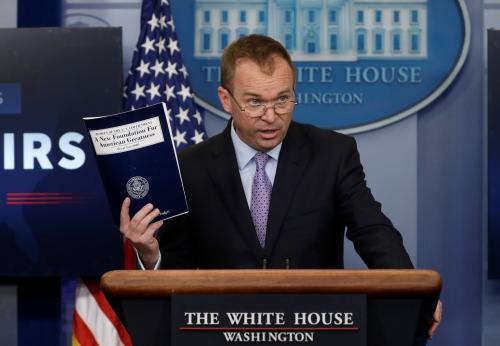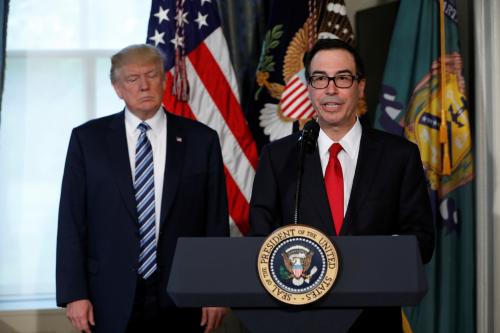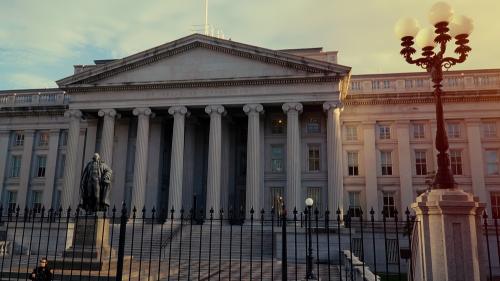The Office of Financial Research (OFR), the federal agency Congress set up after the 2007-09 financial crisis to warn about risks and collect data to fill blind spots in the U.S. financial system, is a target of the Trump Administration’s deregulatory agenda. Its staff is being cut by more than one-third and the Administration is revising the office’s mission to limit its independence.
We should be worried about these developments. Identifying financial stability risks and data gaps means saying things that are unpopular. That mission requires more independence, not less.
A decade ago, our byzantine financial regulatory sector was blindsided by the biggest economic calamity since the Great Depression. Financial regulators’ missions overlapped in some sectors but left yawning gaps in others. Many people inside and outside government were concerned about the nationwide housing jamboree. No one in power, though, foresaw how its collapse could spread panic through all sorts of financial markets and instruments, such as commercial paper, money market funds, and the “repo” market. No one foresaw the bailout of banks and nonbanks alike.
Congress created the OFR in the hope that a more all-encompassing view of the system and its linkages could help avoid a future failure. The new office would assemble data from the regulators and have subpoena power to collect data directly from financial companies active in markets where it had identified potential risks. The OFR would conduct its own independent research, analysis, and monitoring. Given its broad purview and lack of direct supervisory responsibilities, the OFR would be uniquely poised to set off the alarm before the next financial problem turned into a crisis.
Inspired by these mandates, I joined the OFR’s research staff early on, after a decade at the Federal Reserve. Years later, as an insider-turned-outsider, I am proud of what the OFR accomplished. Still, I can see that the office has faced and continues to face challenges. It only recently proposed its first permanent data collection from the private sector. It has faced organizational problems. And when it took on substantive policy questions, it faced resistance. For instance, the office’s early study on the asset management industry received substantial blowback from the private sector and from other government entities. Legislation to abolish the office has been a perennial on Capitol Hill. It seems raising concerns about potential risks during good times won’t win you many friends.
Of course, the grandest expectations around the OFR—that it could create a “real-time market snapshot” bringing together all kinds of financial data—were always unrealistic. It took decades for the government to create a reliable gross national product estimate, bringing together data from many public and private sources. To some extent, dwelling on unrealistic expectations plays into the hands of those who never wanted an OFR in the first place.
Identifying financial stability risks and data gaps means saying things that are unpopular. That mission requires more independence, not less.
It should come as no surprise that an Administration with a small-government bias and a pledge to reverse the previous Administration’s initiatives would make changes at the OFR. Memories of a crisis fade and the pendulum swings back. The changes so far have not been fatal to regulatory reform. Still, the OFR remains a target for some deregulators.
Version 2.0?
The Administration has not proposed closing the office. Rather, it is using budget cuts to restructure and reorient.
The new OFR, as currently envisioned, would tighten its focus on supporting the Financial Stability Oversight Council (FSOC)—the venue Congress created to force regulators to work together on financial stability. The new OFR would conduct less research and do more monitoring. It would promote data sharing across the agencies and, to the extent possible, with the public. Its agenda would increasingly be set by FSOC, and the Treasury Secretary who serves as FSOC Chair, rather than by its own staff or leadership.
These changes can be seen as consistent with the letter of the law, but they could severely limit the OFR’s value. Here are a couple of concerns:
1. The agencies need to share data
First, regulators still do not share enough data. Each agency collects data from specific institutions and markets on a confidential basis for supervisory purposes. But those data need to be combined for the OFR and FSOC to track risks across markets.
To fulfill its data mandates, the OFR has signed bilateral memoranda of understanding with various financial regulators. As a result, it now has access to the data the SEC collects from hedge funds (Form PF) and the data the Fed collects from banks for its annual stress tests (Y-14). But procuring such data takes months or years, and many requests remain under discussion among legal teams.
Ideally, the OFR would be a conduit through which agencies could learn from each other. Data about related markets could improve each agency’s ability to accomplish its mission. There may be ways in which the OFR could make regulators’ confidential data available to other regulators, appropriately aggregated or masked. Similarly, the OFR could find ways to make aggregated or masked data available to outside researchers, as the IRS and other agencies have done. This is not being done, but could be.
2. FSOC needs to welcome an objective voice
Second, the OFR needs to have its own voice. The shift toward serving FSOC is fine—the OFR has always supported FSOC with analysis for its working groups and on projects such as its annual report—but it shouldn’t curb the OFR’s ability to pursue its own leads.
FSOC is not an entity to itself. It is merely a coordinating mechanism to get regulators to work together. (The main power it has used, to designate nonbank financial firms for heightened Fed supervision, is being curtailed under this Administration.) Most of the agencies don’t have a financial stability mandate. They also have their own research teams and, to state it mildly, they prefer to be the ones analyzing their own policies. (One SEC staff memoir called the OFR’s asset management study an “act of war against the SEC,” here.) If the OFR’s research agenda were solely decided by the agencies, it would likely be a quite limited research agenda.
In fact, much of the OFR’s analysis for FSOC has been on the OFR’s own initiative and has provided value. For example, OFR staff presented to FSOC its analysis identifying companies still taking disproportionate risks in the credit derivatives market, many years after those instruments helped bring down AIG during the financial crisis. (Those conclusions were available in a public working paper, carefully masking individual firm identities). The OFR has identified risks in other areas where few others were looking—for example, in repo markets and hedge funds. It put out financial monitors (see here and here), analyzed policy, and pointed out the downsides of regulatory reform.
The cuts to the OFR’s budget and staffing have made it less likely that it can build on that work. The OFR is staffed by experienced analysts and economists with a broad mix of skills and backgrounds. Losing core expertise reduces the office’s ability to identify potential risks or to provide useful analysis during the next crisis.
Conclusion
The Administration could get more out of the OFR—and improve its ability to analyze and respond to financial stability risks—if it strongly encouraged FSOC member agencies to share their data, with the OFR and with each other, and if the OFR maximized its independence, supporting its role to provide objective analysis. I strongly hope these things happen.
If the Administration doesn’t make those changes, Congress could change the law to strengthen the OFR’s data collection and sharing mandates and to make it organizationally more independent. Perhaps the office should instead be its own entity, completely outside the Treasury Department. Changing OFR could be done with or without changing FSOC. One proposal from former Fed vice chair Don Kohn would give FSOC itself an independent leadership, with the OFR as its research arm; the Bipartisan Policy Center proposed making OFR more independent by removing it from Treasury and possibly moving it to New York to be able to better directly monitor markets; the American Enterprise Institute proposed putting the OFR in the Commerce Department. But Congress doesn’t seem likely to take up this topic any time soon. I hope it will not take another crisis to spur policymakers to remold the OFR and FSOC into a more effective financial early-warning system.
Greg Feldberg is a Research Scholar at the Yale School of Management and Director of Research at the Yale Program on Financial Stability. He was formerly Senior Associate Director for Research and Analysis at the Office of Financial Research and Director of Research at the Financial Crisis Inquiry Commission.
The author did not receive any financial support from any firm or person for this article or from any firm or person with a financial or political interest in this article. He is currently not an officer, director, or board member of any organization with an interest in this article.
The Brookings Institution is committed to quality, independence, and impact.
We are supported by a diverse array of funders. In line with our values and policies, each Brookings publication represents the sole views of its author(s).






